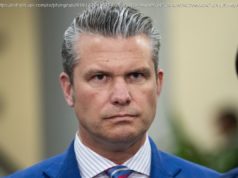French voters chose lawmakers in lower house of parliament in key test for new president.
PARIS — French voters appeared to give their new president a clear mandate to implement far-reaching changes with Sunday’s first round of parliamentary elections, as his party won a crushing victory over France’s two establishment parties.
With 94% of the votes counted, President Emmanuel Macron’s year-old Republic on the Move! party won 28%. The conservative Republicans had 16%, followed by the far-right National Front with 14%. The far-left party of Jean-Luc Melenchon had 11%, while the Socialists, who dominated the last National Assembly, had just 7%.
Polling agencies projected that Macron’s party would win more than 400 of the 577 seats in the National Assembly in the second-round vote next Sunday. Exit polls said Macron’s party could end up with as many as 445 seats — far more than the president needs to get his programs through Parliament.
Turnout for Sunday’s vote, however, was estimated at less than 49%, a record low for modern France.
Macron’s prime minister, Edouard Philippe, declared Sunday night that the second round of voting would give the assembly a “new face.”
“France is back, ” he said.
“There is a strong demand for renewal, “ said Jerome Fourquet, an analyst with the IFOP polling firm based in Paris. „A good number of political heavyweights have already been swept aside (during the presidential elections) . We can see the same desire for renewal in the legislative elections.“
The far-right National Front did not perform as strongly as it did during the presidential elections when its leader, Marine Le Pen, made it to the second round and was defeated by Macron, who had never held elected office.
France’s two main parties, the Republicans and the Socialists, lost in the presidential election’s first round of voting. And Sunday’s exit polls predicted the Republicans and Socialists would win 130 and 25 seats, respectively, as much of their support defected to Macron’s party. They previously held 199 and 284, respectively, according to Parliament’s website.
Macron, 39, a former banker and economics minister in the government of former president François Hollande, won the presidency after offering something fresh and hopeful — and in the center. His victory came amid a wave of populist wins, with the British referendum to leave the European Union and the U. S. election of President Trump. French voters faced a choice between deeply unpopular mainstream parties — Hollande’s Socialist government, for example, or Le Pen’s anti-immigration National Front.
“We no longer believe in politics, but he (Macron) has a different approach, ” said Peggy Clap, 52, who works in film in Paris and voted for the Macron party candidate in her district. “I want to see how he’ll do and if he will manage to move the big (issues) of politics in France. I want to believe it’s possible. We had the right and we had the left, and it doesn’t work.“
If Macron’s party performs as well as expected in the second round next Sunday, he will have the votes in Parliament to enact a program of radical reforms, including changes to the labor market and pension system to jump-start France’s lagging economy.
He will still face an uphill battle with labor reforms as he tries to make hiring and firing, along with negotiations with unions, more flexible.
Some doubted that Macron could implement change because his new party had to quickly gather candidates to run for Parliament and many have never held elected office.
“Becoming a deputy (in Parliament) without proper training is unthinkable. We’ll have (lawmakers) that come from out of nowhere, “ said Thierry Courdacher, 52, an engineer in Paris, who declined to say which party he supported.
„Macron’s movement is like a messianic call. People have been attracted by political feel-good marketing, “ he said. „But one can’t suddenly become a lawmaker on the spur of the moment. Political ideas take time to mature.“






